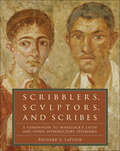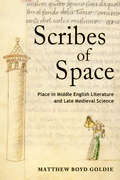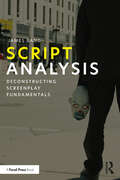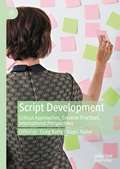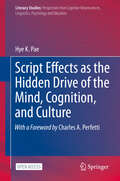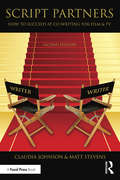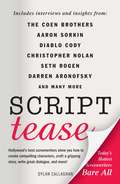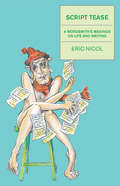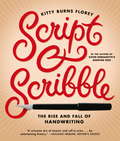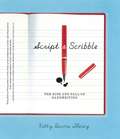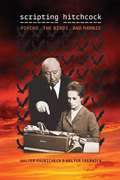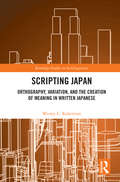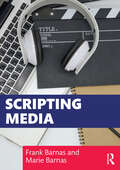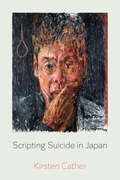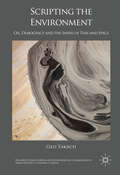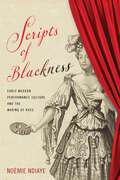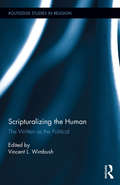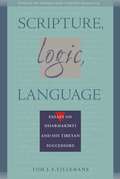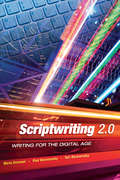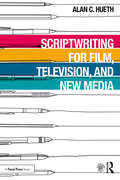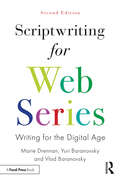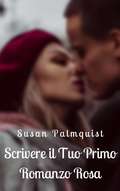- Table View
- List View
Scribblers, Sculptors, and Scribes: A Companion to Wheelock's Latin and Other Introductory Textbooks
by Richard A. LaFleurAn outstanding and enjoyable companion reader to the Wheelock’s curriculum, or any introductory Latin textbook.From one of the country’s leading Latinists, this reader is the perfect complement to any Latin program, and the first collection of entirely authentic classical Latin texts that beginning students, from the very first day of their introduction to Latin, can read and enjoy.Beginning with simple graffiti, Scribblers, Sculptors, and Scribes moves toward longer inscriptions and literary texts as students progress. Designed to accompany the bestselling Wheelock’s curriculum, its 40 chapters are linked with the 40 chapters of Wheelock’s Latin, but the book’s readings and design features make it suitable for use alongside any introductory college or high-school Latin textbook. Packed with hundreds of actual Latin inscriptions, proverbs, and texts, this outstanding textbook also includes dozens of photos and illustrations, maps, discussion and comprehension questions, grammar capsules, a Latin–English vocabulary section, a summary of forms, and much more.
Scribes of Space: Place in Middle English Literature and Late Medieval Science
by Matthew Boyd GoldieScribes of Space posits that the conception of space—the everyday physical areas we perceive and through which we move—underwent critical transformations between the thirteenth and fifteenth centuries. Matthew Boyd Goldie examines how natural philosophers, theologians, poets, and other thinkers in late medieval Britain altered the ideas about geographical space they inherited from the ancient world. In tracing the causes and nature of these developments, and how geographical space was consequently understood, Goldie focuses on the intersection of medieval science, theology, and literature, deftly bringing a wide range of writings—scientific works by Nicole Oresme, Jean Buridan, the Merton School of Oxford Calculators, and Thomas Bradwardine; spiritual, poetic, and travel writings by John Lydgate, Robert Henryson, Margery Kempe, the Mandeville author, and Geoffrey Chaucer—into conversation. This pairing of physics and literature uncovers how the understanding of spatial boundaries, locality, elevation, motion, and proximity shifted across time, signaling the emergence of a new spatial imagination during this era.
Script Analysis: Deconstructing Screenplay Fundamentals
by James BangA comprehensive step-by-step guide to deconstructing screenplay fundamentals, this book will allow readers to understand the elements, functions and anatomy of a screenplay. Not only will this book enable readers to accomplish a thorough analysis of a screenplay and understand the dramatic elements and their functions, but screenwriters will be able to apply these steps to their own writing. The book explores theme and premise, provides an in-depth study of character development, and breaks down the dramatic elements needed to construct a solid screenplay. It provides examples of the three-act structure, The Hero’s Journey, and the sequence method. Furthermore, it explores how the main plot and subplots are used in a storyline and discusses the importance of setting. Finally, it reveals screenwriting techniques and tools used by professional screenwriters, such as dramatic irony, reversal, and setup/payoff. To connect with a broad range of readers, the case studies used in this book are mainly from contemporary films, including Get Out (2017), Lady Bird (2018), The Dark Knight (2008), Toy Story (1994), Parasite (2019) and Whiplash (2014). Readers will understand how professional screenwriters use fundamental elements to construct, shape, develop, and tell a visual story. After reading this book, readers will comprehend the components critical to developing a screenplay. Ideal for students of screenwriting and filmmaking who want to better understand how to comprehensively analyze a screenplay, as well as professional screenwriters who want to utilize this method to better develop their own scripts.
Script Development: Critical Approaches, Creative Practices, International Perspectives
by Craig Batty Stayci TaylorThis book offers the first international look at how script development is theorised and practiced. Drawing on interviews, case studies, discourse analysis, creative practices and industry experiences, it brings together scholars and practitioners from around the world to offer critical insights into this core, but often hidden, aspect of screenwriting and screen production. Chapters speculate and reflect upon how creative, commercial and social practices – in which ideas, emotions, people and personalities combine, cohere and clash – are shaped by the practicalities, policies and rapid movements of the screen industry. Comprising two parts, the book first looks ‘into’ script development from a theoretical perspective, and second looks ‘out from’ the practice to form practitioner-led perspectives of script development. With a rising interest in screenwriting and production studies, and an increased appetite for practice-based research, the book offers a timely mapping of the terrain of script development, providing rich foundations for both study and practice.
Script Effects as the Hidden Drive of the Mind, Cognition, and Culture (Literacy Studies #21)
by Hye K. PaeThis open access volume reveals the hidden power of the script we read in and how it shapes and drives our minds, ways of thinking, and cultures. Expanding on the Linguistic Relativity Hypothesis (i.e., the idea that language affects the way we think), this volume proposes the “Script Relativity Hypothesis” (i.e., the idea that the script in which we read affects the way we think) by offering a unique perspective on the effect of script (alphabets, morphosyllabaries, or multi-scripts) on our attention, perception, and problem-solving. Once we become literate, fundamental changes occur in our brain circuitry to accommodate the new demand for resources. The powerful effects of literacy have been demonstrated by research on literate versus illiterate individuals, as well as cross-scriptal transfer, indicating that literate brain networks function differently, depending on the script being read. This book identifies the locus of differences between the Chinese, Japanese, and Koreans, and between the East and the West, as the neural underpinnings of literacy. To support the “Script Relativity Hypothesis”, it reviews a vast corpus of empirical studies, including anthropological accounts of human civilization, social psychology, cognitive psychology, neuropsychology, applied linguistics, second language studies, and cross-cultural communication. It also discusses the impact of reading from screens in the digital age, as well as the impact of bi-script or multi-script use, which is a growing trend around the globe. As a result, our minds, ways of thinking, and cultures are now growing closer together, not farther apart.
Script Partners: How to Succeed at Co-Writing for Film & TV
by Matt Stevens Claudia JohnsonSome of the greatest movies and television series have been written by script partners. Script Partners, Second Edition brings together the experience, knowledge, and winning techniques of Hollywood’s most productive partnerships—including Lucy Alibar & Benh Zeitlin (Beasts of the Southern Wild ), Craig Borten & Melisa Wallack (Dallas Buyers Club), and Andrew Reich & Ted Cohen (Friends). Established and aspiring screenwriters will learn how to pick the right partner and the right project, co-create character and story structure, co-draft and revise a script, collaborate in film school and in the film industry, and manage both the creative and business sides of partnerships.
Script Tease
by Dylan CallaghanThe Newest Screenwriting Secrets What do an erstwhile stripper, an ex-gambling addict, and a stoned Canadian teenager have in common? They wrote your favorite movies, and they're not who you'd expect. Diablo Cody (Juno), Darren Aronofsky (The Wrestler), and Seth Rogan (Superbad) are among the scribes interviewed in Script Tease, your main line to the most current screenwriting wisdom. Their funny, even touching tales of how they made it despite the odds will give you a revealing look into what it really takes to get into the industry. With the guidance of recent greats like Aaron Sorkin (The Social Network) and the Coen Brothers (True Grit), you will learn how to hone your craft and make it in an industry where only the best succeed.
Script Tease
by Dylan CallaghanThe Newest Screenwriting Secrets What do an erstwhile stripper, an ex-gambling addict, and a stoned Canadian teenager have in common? They wrote your favorite movies, and they're not who you'd expect. Diablo Cody (Juno), Darren Aronofsky (The Wrestler), and Seth Rogan (Superbad) are among the scribes interviewed in Script Tease, your main line to the most current screenwriting wisdom. Their funny, even touching tales of how they made it despite the odds will give you a revealing look into what it really takes to get into the industry. With the guidance of recent greats like Aaron Sorkin (The Social Network) and the Coen Brothers (True Grit), you will learn how to hone your craft and make it in an industry where only the best succeed.
Script Tease: A Wordsmith's Waxings on Life and Writing
by Eric NicolWhy write in the first place, other than your grocery list? Eric Nicol believes it’s the second-most satisfying thing you can do lying down. But it’s not enough to want to write. You must need to write. Now, after more than seventy years of scribbling – he wrote for the school newspaper at Lord Byng High School in Vancouver, British Columbia – Eric holds forth on dangling participles, punctuation, and literary jargon. What’s more, he answers the burning question: "How much should creative writers depend on editors to correct their grammar?" Then Eric provides a wide selection of essays to demonstrate how it’s done. These include a dramatic demonstration of the chutzpah of a big Tom wild turkey and its harem on a B.C. Gulf Island, the discovery that Eric’s one-way-view window in the bathroom has been installed incorrectly, the trials and tribulations of computers and the creative process, and a riposte to the query, "Are nipples really necessary on guys?" Pure Nicol. Minted in Canada. Priceless!
Script Tease: Today's Hottest Screenwriters Bare All
by Dylan CallaghanThe Newest Screenwriting SecretsWhat do an erstwhile stripper, an ex–gambling addict, and a stoned Canadian teenager have in common? They wrote your favorite movies, and they're not who you'd expect.Diablo Cody (Juno), Darren Aronofsky (The Wrestler), and Seth Rogan (Superbad) are among the scribes interviewed in Script Tease, your main line to the most current screenwriting wisdom. Their funny, even touching tales of how they made it despite the odds will give you a revealing look into what it really takes to get into the industry.With the guidance of recent greats like Aaron Sorkin (The Social Network) and the Coen Brothers (True Grit), you will learn how to hone your craft and make it in an industry where only the best succeed.
Script and Scribble
by Kitty Burns Florey"A witty and readable (and fetchingly illustrated and glossed) excursion through the history of handwriting." --The Wall Street JournalLet a self-confessed "penmanship nut" take you on a tour of the strange and beautiful world of handwriting. Since her Catholic school days learning the Palmer Method, Kitty Burns Florey has been in love with handwriting, and can't imagine a world where schools forego handwriting drills in favor of teaching something called keyboarding. In this "winsome mix of memoir and call to arms" (Chicago Tribune), Florey weaves together the evolution of writing implements and scripts, pen-collecting societies, the golden age of American penmanship, and the growth in popularity of handwriting analysis, and asks the question: Is writing by hand really no longer necessary in today's busy world? "Charmingly composed and handsomely presented," Script & Scribble traces the history of penmanship to the importance of writing by hand in an increasingly digital age (The Boston Globe). From the Trade Paperback edition.
Script and Scribble: The Rise and Fall of Handwriting
by Kitty Burns FloreyFlorey tackles the importance of writing by hand and its place in our increasingly electronic society in this fascinating exploration of the history of handwriting.
Scripting Hitchcock: Psycho, The Birds, and Marnie
by Walter Srebnick Walter RaubicheckNominated for a nonfiction Edgar Allan Poe Award from the Mystery Writers of America, Scripting Hitchcock explores the collaborative process between Alfred Hitchcock and the screenwriters he hired to write the scripts for three of his greatest films: Psycho, The Birds, and Marnie. Drawing from extensive interviews with the screenwriters and other film technicians who worked for Hitchcock, Walter Raubicheck and Walter Srebnick illustrate how much of the filmmaking process took place not on the set or in front of the camera, but in the adaptation of the sources, the mutual creation of plot and characters by the director and the writers, and the various revisions of the written texts of the films. Hitchcock allowed his writers a great deal of creative freedom, which resulted in dynamic screenplays that expanded traditional narrative and defied earlier conventions. Critically examining the question of authorship in film, Raubicheck and Srebnick argue that Hitchcock did establish visual and narrative priorities for his writers, but his role in the writing process was that of an editor. While the writers and their contributions have generally been underappreciated, this study reveals that all the dialogue and much of the narrative structure of the films were the work of screenwriters Jay Presson Allen, Joseph Stefano, and Evan Hunter. The writers also shaped American cultural themes into material specifically for actors such as Janet Leigh, Tippi Hedren, and Tony Perkins. This volume gives due credit to those writers who gave narrative form to Hitchcock's filmic vision.
Scripting Japan: Orthography, Variation, and the Creation of Meaning in Written Japanese (Routledge Studies in Sociolinguistics)
by Wesley C. RobertsonImagine this book was written in Comic Sans. Would this choice impact your image of me as an author, despite causing no literal change to the content within? Generally, discussions of how language variants influence interpretation of language acts/users have focused on variation in speech. But it is important to remember that specific ways of representing a language are also often perceived as linked to specific social actors. Nowhere is this fact more relevant than in written Japanese, where a complex history has created a situation where authors can represent any sentence element in three distinct scripts. This monograph provides the first investigation into the ways Japanese authors and their readers engage with this potential for script variation as a social language practice, looking at how purely script-based language choices reflect social ideologies, become linked to language users, and influence the total meaning created by language acts. Throughout the text, analysis of data from multiple studies examines how Japanese language users' experiences with the script variation all around them influence how they engage with, produce, and understand both orthographic variation and major social divides, ultimately evidencing that even the avoidance of variation can become a socially significant act in Japan.
Scripting Media
by Frank Barnas Marie BarnasBringing together professional standards, practices, and jargon from across the industry, Scripting Media provides a complete overview of writing for divergent forms of media. While some forms of media writing have been honed and standardized over generations, others demand new ways of thinking and collaborating. Covering traditional forms of scriptwriting, such as news, advertising, and film scripting, as well as newer and more emerging areas of social media and virtual reality, this book is designed to prepare readers for the varying formats, styles, and techniques specific to each medium. Each chapter contains a list of key terms, an historical overview of the area, and technical specifications for students to be aware of. Exercises, essay prompts, and online links help reinforce students’ knowledge and provide avenues for private study. Written in an accessible and engaging style by two renowned media practitioners, authors, and teachers, Scripting Media is essential reading for students approaching media writing for the first time.
Scripting Media
by Frank Barnas Marie BarnasBringing together professional standards, practices, and jargon from across the industry, Scripting Media provides a complete overview of writing for divergent forms of media.While some forms of media writing have been honed and standardized over generations, others demand new ways of thinking and collaborating. Covering traditional forms of scriptwriting, such as news, advertising, and film scripting, as well as newer and more emerging areas of social media and virtual reality, this book is designed to prepare readers for the varying formats, styles, and techniques specific to each medium. Each chapter contains a list of key terms, an historical overview of the area, and technical specifications for students to be aware of. Exercises, essay prompts, and online links help reinforce students’ knowledge and provide avenues for private study.Written in an accessible and engaging style by two renowned media practitioners, authors, and teachers, Scripting Media is essential reading for students approaching media writing for the first time.
Scripting Suicide in Japan (New Interventions in Japanese Studies #5)
by Kirsten CatherA free ebook version of this title is available through Luminos, University of California Press's Open Access publishing program. Visit www.luminosoa.org to learn more. Japan is a nation saddled with centuries of accumulated stereotypes and loaded assumptions about suicide. Many pronouncements have been made about those who have died by their own hand, without careful attention to the words of the dead themselves. Drawing upon far-ranging creations by famous twentieth- and twenty-first-century Japanese writers and little-known amateurs alike—such as death poems, suicide notes, memorials, suicide maps and manuals, works of literature, photography, film, and manga—Kirsten Cather interrogates how suicide is scripted and to what end. Entering the orbit of suicidal writers and readers with care, she shows that through close readings these works can reveal fundamental beliefs about suicide and, just as crucially, about acts of writing. These are not scripts set in stone but graven images and words nonetheless that serve to mourn the dead, straddling two impulses: to put the dead to rest and to keep them alive forever. These words reach out to us to initiate a dialogue with the dead, one that can reveal why it matters to write into and from the void.
Scripting the Environment: Oil, Democracy and the Sands of Time and Space (Palgrave Studies in Media and Environmental Communication)
by Geo TakachThis volume explores how to engage audiences both beyond and within the academy more deeply in environmental research through arts-based forms. It builds on a multi-pronged case study of scripts for documentary film, audio-visual and stage formats, focusing on how the identity of a place is constructed and contested in the face of environmental concerns around fossil-fuel extraction in a globalized, visual society--and specifically on the rising, international public-relations war over Alberta’s stewardship of the tar sands. Each script is followed by discussion of the author’s choices of initiating idea, research sources, format, voices, world of the story, structure and visual style, and other notes on the convergence of synthesis, analysis and (re)presentation in the script. Included are lively analysis and commentary on screenwriting and playwriting theory, the creation and dissemination of the scripts, and reflections to ground a proposed framework for writing eco-themed scripts for screen, audio-visual and stage formats.
Scripts of Blackness: Early Modern Performance Culture and the Making of Race (RaceB4Race: Critical Race Studies of the Premodern)
by Noémie NdiayeScripts of Blackness shows how the early modern mass media of theatre and performance culture at-large helped turn blackness into a racial category, that is, into a type of difference justifying emerging social hierarchies and power relations in a new world order driven by colonialism and capitalism.In this book, Noémie Ndiaye explores the techniques of impersonation used by white performers to represent Afro-diasporic people in England, France, and Spain in the sixteenth and seventeenth centuries, using a comparative and transnational framework. She reconstructs three specific performance techniques—black-up (cosmetic blackness), blackspeak (acoustic blackness), and black dances (kinetic blackness)—in order to map out the poetics of those techniques, and track a number of metaphorical strains that early modern playtexts regularly associated with them. Those metaphorical strains, the titular scripts of blackness of this book, operated across national borders and constituted resources, as they provided spectators and participants with new ways of thinking about the Afro-diasporic people who lived or could/would ultimately live in their midst.Those scripts were often gendered and hinged on notions of demonization, exclusion, exploitation, animalization, commodification, sexualization, consensual enslavement, misogynoir, infantilization, and evocative association with other racialized minorities. Scripts of Blackness attempts to grasp the stories that Western Europeans told themselves through performative blackness, and the effects of those fictions on early modern Afro-diasporic subjects.
Scripturalizing the Human: The Written as the Political (Routledge Studies in Religion)
by Vincent L. WimbushScripturalizing the Human is a transdisciplinary collection of essays that reconceptualizes and models "scriptural studies" as a critical, comparative set of practices with broad ramifications for scholars of religion and biblical studies. This critical historical and ethnographic project is focused on scriptures/scripturalization/scripturalizing as shorthand for the (psycho-cultural and socio-political) "work" we make language do for and to us. Each essay focuses on an instance of or situation involving such work, engaging with the Bible, Book of Mormon, Bhagavata Purana, and other sacred texts, artifacts, and practices in order to explore historical and ongoing constructions of the human. Contributors use the category of "scriptures"—understood not simply as texts, but as freighted shorthand for the dynamics and ultimate politics of language—as tools for self-illumination and self-analysis. The significance of the collection lies in the window it opens to the rich and complex view of the highs and lows of human-(un-)making as it establishes the connections between a seemingly basic and apolitical religious category and a set of larger social-cultural phenomena and dynamics.
Scripture, Logic, Language
by Tom J. Tillemans E. Gene SmithDharmakirti, an Indian Buddhist philosopher of the seventh century, explored the nature, limits, and justifications of rationality within the context of Buddhist religious and metaphysical concerns. While Dharmakirti is widely recognized for his crucial innovations in Indian logic and semantic theory, his notoriously difficult thought nonetheless remains poorly understood. In this volume, one of the world's leading scholars of Buddhist philosophy sheds light on the interrelated topics of scripture, logic, and language in the works of Dharmakirti and his philosophical heirs, both Indian and Tibetan. Professor Tillemans' knowledgeable explanations of such technical subjects as the apoha theory of reference and the problem of entailment (vyapti) are coupled throughout with insightful reflections on how best to evaluate Dharmakirti's theories in light of contemporary philosophical thought. Scripture, Logic, Language is an informative and thought-provoking study for students of Buddhism as well as for those in the wider field of philosophy.
Scriptwriting 2.0: Writing for the Digital Age
by Marie DrennanOnline media is and will continue to be at the forefront of entertainment; this book introduces readers to this new world and helps them create good content for it. It is a compact, practical guide for those who want to explore scriptwriting for the digital age while also learning essential skills and techniques central to new media writing. Scriptwriting 2.0 contains advice on writing both short- and long-form webisodes as part of a series, as well as standalone pieces. It then goes beyond the writing process to discuss revising, production, promotion and copyright. It is written in a friendly, readable and jargon-free style and includes real-world examples from successful series and a sample script. Readers can access full episodes of the two series discussed at length as well as samples from several other web series.
Scriptwriting for Film, Television and New Media
by Alan C. HuethWhat are the foundations of scriptwriting? Why do some scripts gain more prestige than others? How do you write a script and get it noticed? Scriptwriting for Film, Television and New Media answers these questions and more, offering a comprehensive introduction to writing scripts for film, television, the Internet, and interactive multimedia. Author Alan C. Hueth explains not just how to write, but how to think and apply the fundamental principles of screenwriting to multiple platforms and genres. This includes chapters on numerous script formats, including drama and comedy in film and TV, short films, commercials and PSAs, news and sports, interview shows, documentaries, reality shows, and corporate and educational media, including interactive multimedia. This book also addresses legal and ethical issues, how to become a professional scriptwriter, and a section on production language that provides helpful explanations of how camera, locations, visual and audio effects combine on screen to engage and sustain viewer attention, and, consequently, how to improve scriptwriting technique. The book features numerous case studies and detailed examples, including chapter by chapter exercises, plot diagrams, quick-look and learn tables that assist readers to quickly understand genre related script elements, and in-depth script close-ups to examine precisely how writers utilize the principles and elements of drama to create a successful script. It is also supported by a comprehensive companion website with further case studies, assignments, video clips, and examples of films and programs discussed in the book. Scriptwriting for Film, Television, and New Media is ideal for aspiring scriptwriters and anyone wanting to broaden their understanding of how successful scripts are created.
Scriptwriting for Web Series: Writing for the Digital Age
by Marie Drennan Yuri Baranovsky Vlad BaranovskyScriptwriting for Web Series: Writing for the Digital Age offers aspiring writers a comprehensive how-to guide to scriptwriting for web series in the digital age. Containing in-depth advice on writing both short- and long-form webisodes as part of a series, as well as standalone pieces, it goes beyond the screenwriting process to discuss production, promotion and copyright in order to offer a well-rounded guide to creating and distributing a successful web series. Written in a friendly, readable and jargon-free style by an experienced scriptwriting professor and two award-winning web series creators, it offers invaluable professional insights, as well as examples from successful series, sample scripts and interviews with key series creators, writers and industry professionals.
Scrivere il Tuo Primo Romanzo Rosa: Una mini guida
by Susan PalmquistState pensando di scrivere un romanzo rosa, ma non sapete da dove cominciare? Magari non siete sicuri che il romanzo rosa sia il vostro genere. O magari avete scritto la prima bozza del vostro romanzo, ma avete bisogno di qualche suggerimento per perfezionarla? Sia che siate scrittori per la prima volta, o qualcuno che ha bisogno soltanto di qualche informazione, Scrivere il Tuo Primo Romanzo Rosa, è una guida paso, passo che vi conduce attraverso tutti gli elementi importanti. In questo e-book troverete informazioni su - Trovare il giusto sottogenere per voi Come definire la vostra storia Creare personaggi memorabili Come narrare se i personaggi giusti raccontano la vostra storia Come controllare il ritmo della vostra storia Come scrivere dialoghi di ottima qualità ogni volta che scrivete Come presentare il vostro manoscritto Questa guida è una lettura semplice e veloce per ogni aspirante scrittore di romanzi.
